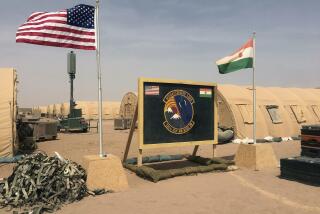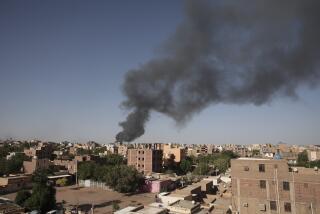NEWS ANALYSIS : U.N. Departure From Bosnia Now More Likely
- Share via
WASHINGTON — The fall of Srebrenica to the Bosnian Serbs has pushed the West closer to a decision to withdraw all U.N. peacekeepers from Bosnia-Herzegovina--a move that could involve as many as 25,000 U.S. ground troops--government and private analysts said Tuesday.
The incursion by the rebel Serb militia into a U.N.-protected “safe area” effectively destroys the last bit of credibility that the West had in the eyes of either the Bosnian Serbs or the Muslim-led Bosnian government, these analysts say.
American and European officials say their immediate concern is how to rescue the hundreds of Dutch peacekeeping troops who were routed Tuesday by the Bosnian Serbs. The Dutch, already cut off from supplies, have moved to the village of Potocari. Thousands of Muslim refugees also are there.
Beyond that, however, the major powers and the United Nations also must decide--possibly within the next few days--whether the United Nations finally is prepared to back up its diplomatic and humanitarian efforts with the military power needed to protect its peacekeeping troops.
U.S. and allied officials have scheduled a series of critical meetings today--at the United Nations, at the North Atlantic Treaty Organization and within the five-power Contact Group that is leading the effort to secure a peace settlement--in an effort to hammer out answers to such questions.
Analysts say that if the United Nations proves unwilling to allow NATO to act forcefully to protect U.N. peacekeepers, the pressure for a complete withdrawal will intensify--quite possibly with new impetus from the Clinton Administration, which seems to be losing patience over the Bosnian situation.
In an unusually blunt warning Tuesday, Defense Secretary William J. Perry declared that the takeover of Srebrenica “raises the question as to whether the U.N. force will be able to stay in Bosnia to perform the humanitarian mission.” And Gen. John M. Shalikashvili, chairman of the Joint Chiefs of Staff, disclosed that the United States has warned its allies that U.S. planes no longer will help enforce the “no-fly” zone over Bosnia if NATO is not allowed to destroy Bosnian Serb missile batteries preemptively.
“We are now at a point where we need to balance the safety of [NATO] pilots flying in this operation against the damage that would be done should we terminate” enforcement of the “no-fly” zone, Shalikashvili said. He added that the issue “is being discussed” among the Western allies.
The United States has pledged to help evacuate U.N. peacekeepers who find themselves in danger--both in emergency situations and if the United Nations orders a full-scale withdrawal--but Administration officials insisted that no such moves were imminent.
White House Press Secretary Mike McCurry said Washington is looking first to a new 10,000-member European rapid-reaction force to make the initial efforts to evacuate the Dutch forces.
McCurry said that, as far as he knows, neither NATO nor the United States has received any request from the allies to take part in such an operation. About 2,200 Marines are waiting on ships just off the Bosnian coast, but officials say that force is not big enough to do the job.
The rapid-reaction force is still being assembled in Bosnia. U.S. officials said initial elements of the British and Dutch components of the force already are in Bosnia, while French units are expected to arrive in a few days. Much of their equipment, however, is at sea.
U.S. and NATO officials say one factor hampering any quick decision on rescuing the Dutch troops is that authorities still are unsure whether the peacekeepers are in danger and whether the Serbs will permit them to move from their current positions.
“It’s not clear what the situation is on the ground,” U.S. Adm. Leighton W. Smith, commander of NATO forces involved in the Bosnia operation, said in a telephone interview. He said allied commanders have gathered on his flagship to review their contingency plans.
Officials said it also is not clear how far the Europeans will be willing to go in challenging the Bosnian Serbs. On Tuesday, French President Jacques Chirac called on U.N. officials to send the rapid-reaction force to rescue the Dutch “to restore the integrity” of the United Nations.
But U.S. officials appear pessimistic about the prospects for such a move and, under the current U.N. mandate, the rapid-reaction force must have U.N. permission before it can launch any strikes of its own.
Meanwhile, some analysts raised the possibility that the takeover of Srebrenica might embolden the Bosnian Serbs to strike at other U.N. “safe areas” in an effort to prod the allies to leave.
Administration policy-makers are insisting publicly that they want the U.N. troops to stay in Bosnia because to leave would mean the end of the U.N. humanitarian aid mission. “I continue to hope that an extraction will not be necessary,” Perry told Cable News Network.
And time is working against the allies. Military officers say weather considerations alone make it imperative that the allies begin any full-scale withdrawal by early September if they want to finish evacuating the 24,000 U.N. troops now in Bosnia before winter sets in.
More to Read
Sign up for Essential California
The most important California stories and recommendations in your inbox every morning.
You may occasionally receive promotional content from the Los Angeles Times.










